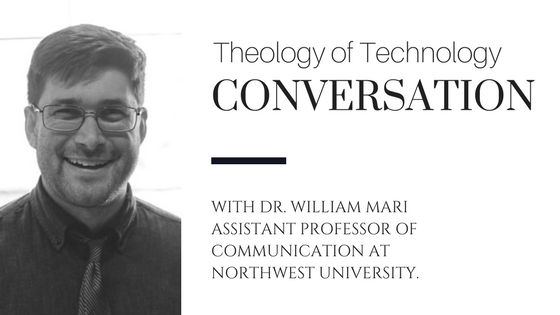In this episode of the TheoTech Podcast, Professor William Mari from Northwest University hosts a conversation on the theology of technology with Chris Lim, co-founder of TheoTech. We talk about whether or not AI will take over the church, the limits of translation technology in bridging cultures, survey various Christian responses to technology and have an all around good time.
Connect with Chris: https://twitter.com/meritandgrace
Connect with Will: https://twitter.com/willthewordguy
Music from: https://icons8.com/music
Quick Links:
- Introduction – What is TheoTech and what does it do?
- What are some Christian responses to technology?
- How do I apply technology’s potential to my Christian life?
- Will AI take over the church?
- Will translation software overcome cultural awkwardness and bring people together?
- How do we empower Christian technologists to use their gifts for God’s Kingdom?
Introduction
0:00 – Intro: What is Theotech? What does customer obsession have to do with it?
1:00 – What TheoTech has done? (A quick history on Ceaseless and spf.io)
1:30 – An example of working backwards from what God desires: Praying for all people (1 Timothy 2).
2:10 – What’s the difference between making God your customer and making humans your customer?
2:50 – Example #2 of working backwards from what God desires: Real time language translation. How many of you go to a church where another language is spoken?
3:25 – Revelation 5, 7, Acts 2, if God is my customer he wants it, even if the American church doesn’t want it.
3:57 – Discussing TheoTech’s flagship product spf.io (prononuced spiffy-oh)
4:20 – “Even if you are primarily an English-speaking church you can invite virtually anyone because you know they will have something in their language for them.”
6:00 – “We get to invent stuff that doesn’t even exist yet, to deliver what God wants. You get to be at the cutting edge.” Connection with an “old theo-technologist tradition”: Gutenberg’s printing press motivated by driving the cost of bibles down to make it accessible to everyone else. #thanksgutenberg
What are some Christian responses to technology?
6:55 – What are some common approaches Christians have to technology? How do faith-y people react to what you’re doing? Point #1: Why you shouldn’t be afraid of technology.
8:10 – Techno-optimism vs Techno-pessimism, comparing the perspectives of technology thinkers Jacques Ellul and Kevin Kelly.
9:30 – Key Insight from the book From the Garden of the City (affiliate link): “When God says he will restore the Creation, it doesn’t only include the natural world…it doesn’t only include human souls…God will redeem human creations, art, music, technology, skyscrapers, etc.”
10:10 – With leaders like Elon Musk worried that Artificial Intelligence will do bad things to our jobs and culture–what do Christians say?
10:40 – Referenced a series by Matias et al. titled Artificial Intelligence in Christian Thought and Practice.
11:09 – Example of what’s happening with the founder of Otto, a self-driving car startup, starting a church of AI.
11:34 – Technology has been a very secularized space, but the conversation is becoming very spiritualized now (because of AI).
12:00 – Why should we be concerned about AI? An analogy from Genesis and the story of the Bible: God created this “artificial intelligence” called humanity and how does he deal with them after they rebel?
13:07 – Jonathan Edwards’ AI to generate sermons (link to talk).
15:10 – Is technology morally neutral? Allusions to Actor Network Theory.
18:15 – What happens when a Christian technologist shows up at church and wants to volunteer? How do we struggle as a church to help someone like that to engage with the Kingdom of God? Inward vs Outward Focus.
21:25 – “If you make God your customer and work backwards from what God wants, you end up making something good…and everything you do that is nice and good is evangelism because people want it and they want more of it and what we’re saying is, ‘This is what God’s Kingdom is like’. ‘We are inviting you to experience what God intended for the world.'”
How do I apply technology’s potential to my Christian life?
22:35 – How do I apply technology’s potential to my Christian life in ways that serve the Kingdom of God.
23:00 – An example from the book “Trust me I’m Lying” (affiliate link): How do we deal with fake news in the world? Breaking the vicious cycle of getting attention to make more money.
23:40 – Follow-up question: You love the truth and you don’t love money, but you enter a system that pushes you in that direction…what do you do?
27:00 – “Facebook is in the addiction business and that’s why I decided to leave”. One of the founders talks about this too in this article.
27:34 – Christians raise the bar. For example: “Why would we ever want to get rich off of getting people addicted to our software?”
Questions & Answers
28:47 – Start of Q&A
29:00 – What do you think of Elon Musk’s project to further AI? (Thoughts on OpenAI) Could we start a Christian institute like that?
31:10 – Do you think AI will potentially take over the church (e.g. automatic sermon generation?) so pastors lose their jobs? Learning from what’s happening with AlphaGo.
33:45 – Humans bring so many other things to the table. “I would argue that AI will help humans to be more human.”
34:12 – Do you think translation software will bridge the awkwardness between people/cultures at a church? It won’t solve it by itself, but like a tool, once you have translation, you might start inviting people from more cultures to your church. We’re getting to the point where people will say, “Now that we can do this, it’s not right for us not too…” It opens up a lot of possibilities.
36:00 – Should Christians have the power to “play God” towards AI in the first place? The analogy in the Bible to our current situation with AI. Should we give AI freedom? How does the Gospel answer these question?
38:10 – “We must be responsible for the things that we’ve made and the consequences of their actions.”
38:50 – What does it look like to empower technologists in the church from an outward perspective?
39:28 – Referenced this talk: 5 ways Christians in tech can serve God’s Kingdom.
40:04 – Find out what techies like, what they love to do. Then think about how they can do more of that, explicitly towards a God-centered purpose. An ad hoc example: Using tech to level up “food-sharing” as described in Isaiah 58 as an example.

